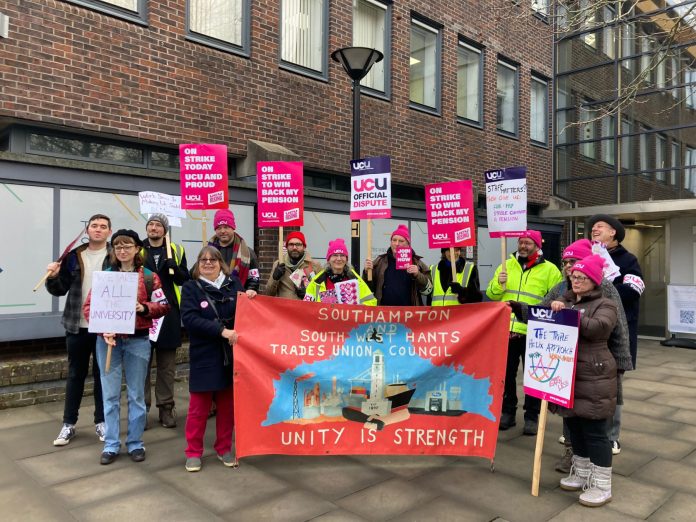Socialist Party members in UCU
The University and College Union (UCU) has suspended planned strike action for two weeks, calling off seven planned strike dates in the two disputes over pensions, pay and conditions.
Other campus unions, including Unite and Unison, have also called off strike dates while a period of ‘intensive negotiation’ is entered in the pay dispute, following talks this week with ACAS.
Tactically, it is a mistake to suspend the strikes given no offer has been made. The momentum is with us and the strike is solid.
The general secretary, Jo Grady, herself tweeted in 2018 that continuing action during ACAS negotiations was a sign of strength, a clear message UCU will not back down. Now in office, she has abandoned this approach.
The justification is that a ‘pause’ in the strikes will allow for a period of ‘calm’ for the negotiations to take place in.
Grady says: “We will not take the foot off the gas pedal”. What is a ‘pause’ if not doing just that?
The employers are currently consulting their own members on the pay-related claims, including around the use of zero-hour contracts. Why remove their feet from the fire at this crucial time?
What’s in the detail?
Grady framed the announced suspension as a victory, brought on by the “significant progress” made in negotiations. Taking the general secretary at her word, many members are understandably optimistic about the possibility of a resolution.
However, the details announced do not justify the celebratory tone. This, combined with the lack of consultation over the decision to suspend the action, is contributing to concerns that Grady and the bureaucratic apparatus around her are preparing to capitulate.
The employers’ statement says that an “impasse” has been reached over pay, not an agreement. The general secretary acknowledges that there has not been a substantial change from the offer rejected by the elected negotiators and Higher Education Committee (HEC) in January.
She says that action on the use of hourly paid contracts is a “down payment” for further movement on the issue of insecure work. But members are not striking for a promise of progress down the line, or for another real-terms pay cut.
Plus the “movement” on hourlypaid contracts amounts to an “expectation” that indefinite contracts with fixed hours will be the norm, but the details are to be negotiated locally.
Confronted by a cost-of-living crisis, and with 90,000 academic staff on insecure contracts, this is not the “sector change” members have been fighting for and that the general secretary promised.
There does appear to be much more substantial movement on pensions, with a potential reversal of cuts – though, again, nothing has been confirmed, and the negotiations now taking place are on pay only.
Transparency and democracy
There must be clear transparency in this dispute. There must be a national reps meeting to discuss where we are with the employers and what happens next. This is what unions such as the Communication Workers Union have done throughout their Royal Mail dispute, that has lasted over six months – the same should happen in the UCU. The reps and members must decide.
Members will remember that when the previous UCU leadership tried to stop the 2017-18 pensions dispute prematurely, it led to a revolt by members. The previous UCU leadership was exposed, which, ironically, led to the election of Jo Grady as union general secretary.
In her statement, Grady says she knows for most members the most important issue is trust. That is, trust that UCU is not about to repeat the attempted capitulation in 2018 by the then general secretary Sally Hunt.
Yet, in the 2018 dispute, the decision to call off the strike was put to members. This time, not even our elected negotiators have been consulted. They are also not involved in the ACAS negotiations. Neither has the HEC or the elected officers of the union.
Grady has frequently bypassed union democracy and publicly criticised the union’s elected bodies, risking undermining the disputes.
Ultimately, it is not Grady or the UCU full-time apparatus that will decide the outcome of these disputes. Under pressure from members, she has already been pushed further than she wanted.
If the offer falls short of what we need, members have the power to push back, reject the offer and keep up the fight, like we did in 2018. We must prepare now to maintain our action, should an attempted capitulation take place.
Vote ‘yes’ in the reballot
Part of that preparation is maintaining our mandate for action. This means success in the reballot, which opened on 21 February, is absolutely vital. It would extend our mandate into the summer term and beyond.
As it stands, we will next strike on 16 March. We should come back strong by coming out on 15 March as well, Budget Day, to strike and march together with NEU, PCS and BMA on the day the Tories outline their plans to further attack workers.
Important too are the National Executive Committee elections, which close on 1 March. It is vital to elect candidates with a fighting programme, to counter the rightward travel of Grady’s supporters.
It is significant that though the ‘UCU Commons’ faction, made up largely of Grady’s supporters, is separate to the right of the union, the two groups have endorsed each other’s candidates.
We must also build effective, democratic and open broad lefts at each layer of the union, to resist the anti-democratic manoeuvring, defend the action, and fight for a programme in universities that will end the marketisation policies underpinning our eroded work conditions.








